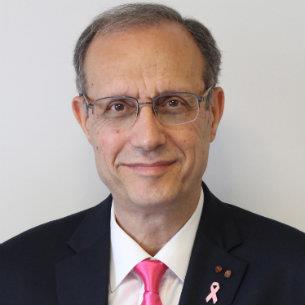Coauthored with Ghassan Abou-Sitta, MD, and Imad Kaddoura, MD
Wars and conflicts are global and affect humans worldwide. According to the United Nations High Commissioner for Refugees (UNHCR), there are 65.6 million refugees and displaced people worldwide. These are people who are forced to leave their homes as a result of conflict, persecution, generalized violence, or human rights violations. In addition to suffering from war-related injuries, these people can get all kinds of diseases, including cancer, and deserve attention.
The American University of Beirut Medical Center (AUBMC) has been in the middle of many conflicts and has served casualties of wars of Lebanon, Israel, Palestine, Syria, as well as refugees and victims of terrorism-related explosions. AUBMC, which has been holding accredited post-graduate medical conferences since 1911 with interruptions due to World War I, World War II, and the Lebanese Civil War, decided to dedicate the 2017 Middle East Medical Assembly (MEMA) to medical consequences of conflict and organized the First International Congress on Conflict Medicine. MEMA included situation analyses of all consequences of war, health care infrastructures destruction, evidence-based practices, and innovations in medicine, surgery, trauma care, and disease in people affected by conflict. MEMA was held in partnership with the International Committee of the Red Cross (ICRC), Physicians without Borders, and UNHCR, in addition to other nongovernmental organizations and regional governmental agencies.
MEMA Conflict Medicine 2017 included a session on the management of cancer in refugees and displaced people. Those patients often present with advanced disease, suffer more complications, have poorer outcomes because of limited health education, limited resources, poor hygiene and living conditions, and limited access to care. Special attention was focused on Syria, where war has caused the worst humanitarian crisis of the 21st century as declared by the UNHCR, with destruction of medical infrastructure and poor access to care for millions of Syrian refugees (see related article in The ASCO Post). Although international agencies and volunteer organizations provide various kinds of needed support, in many host countries, patients with cancer are often designated as having very poor prognosis, are too costly financially, and given low priority.
Not all patients with cancer have a poor prognosis. Treatment can be less costly. We propose that UN and other international agencies, host countries, and medical oncology communities apply resource-stratified guidelines to manage cancers in refugee patients, and apply the principle of doing the best we can with the resources that we have.1-3 Many patients can be treated with a limited work-up, surgery, and minimally expensive systemic therapy instead of turning them away and leaving them to suffer and die from disease.
As for financing of the medical and surgical treatment of refugees and displaced people with cancer and other diseases, UNHCR and other humanitarian agencies need and should be allocated more money and resources. UN and humanitarian agencies should be enabled to ask the governments that fuel wars and conflicts to pay for resulting damages and medical expenses.
Dr. Abou-Sitta and Dr. Kaddoura are professors of plastic and reconstructive surgery at AUB.
References
- Anderson BO, Cazap E, El Saghir NS, et al. Lancet Oncol. 2011;12:387-98.
- El Saghir NS, Farhat RA, Charara RN, et al. Future Oncol. 2014;10:1953-65.
- Chuang LT, Temin S, Camacho R, et al. J Global Oncol. 2016;2:311-40.



Recent posts